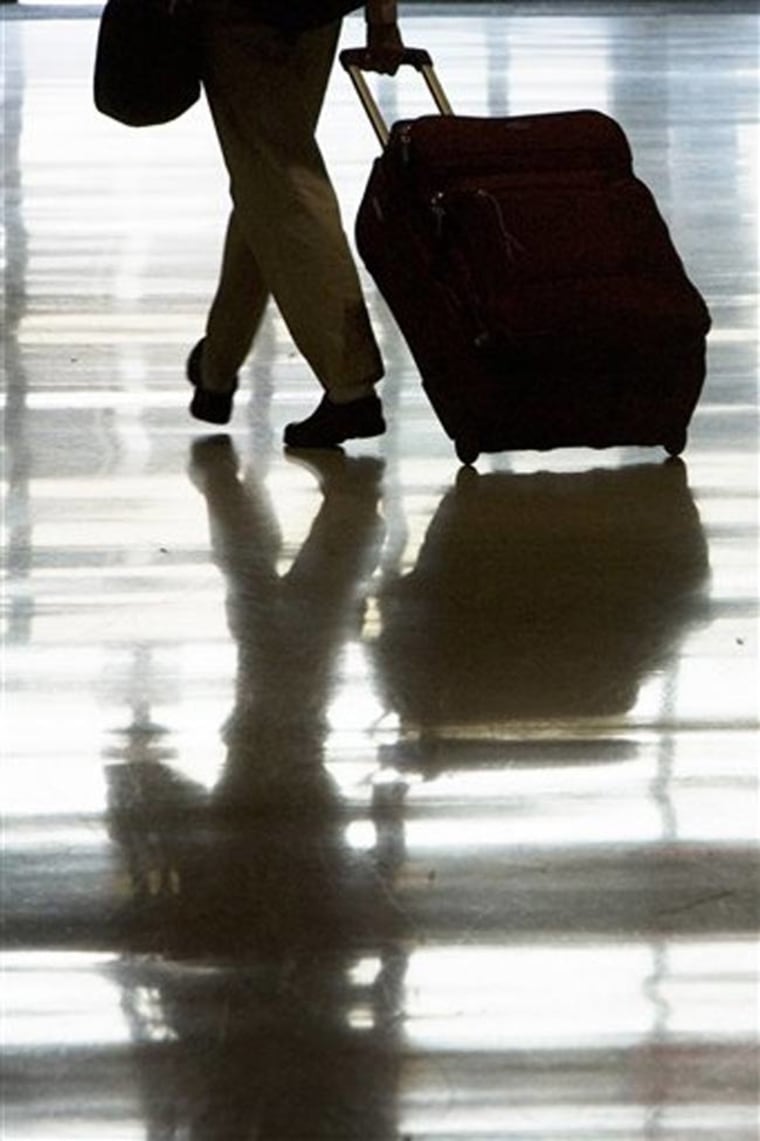It was a time-honored tradition among experienced travelers: Never check luggage, even if you're over the carry-on bag limit.
After all, crossing your fingers and heading for the gate usually paid off. Nine times out of 10, you'd get away with a bag (or two) that exceeded the airline’s carry-on regulations. If you didn't, the worst was that you'd be forced to gate-check your overage. That is, if it didn't fit in the overhead compartment.
Of course, if you’re old enough, you remember when there were no overhead bins on planes — just shallow, narrow racks on which to place coats, and passengers brought onboard only a small airline-logo flight bag. But that’s another story.
The benefits of gate-checking bags can be substantial: a decrease in the chance of loss or delay, delivery to the jet-way shortly after landing and no time-consuming waits in crowded claim areas. Now passengers on American Airlines have yet another incentive to bend the rules — the airline's new $15 one-way fee for the first checked bag.
Luggage police
Passengers will need to beware American's newest employees: The Luggage Police. Anticipating resistance to the surcharge, American has wisely laid on extra bodies. These employees are, essentially, enforcers.
Their task will be to monitor strategic locations (security lines, for instance) to see that passengers aren't toting more than their share of Louis Vuitton. Customers with too many items or bags too large to bring on board "will be assisted in checking their luggage," the airline said.
This idea raises questions. For instance, how will American's baggage employees "assist" passengers, exactly? (We can see it now: "Sir, I'm going to have to ask you to come with me ...")
American spokesman Tim Smith is confident that that those required to pay the fee won't have a prayer of getting around it. Unless, of course, you manage to sneak your contraband roller board past "curbside check-in, ticket counter check-in, self-serve kiosk check-in, our people stationed before security, the TSA checkpoint itself ... without anyone noticing," he said.
Even then, you'll most certainly be told at the gate that you will need to gate-check your bag. And — oh, yes — there will be a fee for that, and, yes, there are credit card machines at the gates, Smith tells Airfarewatchdog.com. (We were wondering about that, and now we know.)
Sure, maybe American runs out of space in the aircraft cabin. For your properly sized carry-ons that inadvertently end up flying cargo class, there will be no fee, it says. That's fair.
No drama, claims American
The airline says the process of charging for checked bags has been relatively hassle-free, claiming there hasn't been any rush for the overhead bins, or any YouTube-worthy fights over space.
That could be largely due to the fact that there is a gigantic loophole in the policy. The vast majority of customers — 75 to 80 percent, Smith says — won't pay at all, ever, due to mileage status, fare type or itinerary (most international travel is excluded).
However, as any frequent traveler knows, it's not the 80 percent you have to worry about — it's the 20 percent, or even 10 percent, of people on a plane who have no idea what they are doing who have the potential to really gum up the works.
American says it is helping to smooth the process. For example, its self-service check-in kiosks have been reprogrammed to accept payment for any checked bags; and the airline has eliminated the $2 fee to check bags at the curb.
Meanwhile, gate and cabin staff are ramping up announcements in the gate area and on the plane, reminding people that it's strictly wheel-end first in the overhead compartment to fit bags more efficiently and to put as much of their baggage as possible under the seat in front of them.
Tough times ahead for airlines
Luggage cops aside, airlines adding the fee (US Airways and United fire up the credit card machines on Aug. 9 and 18, respectively) could end up with the side benefit of needing fewer bodies to get planes on and off the ground. For example, if more passengers carry on their bags, couldn't the airline do away with baggage handlers and ground crew?
"We don't expect a reduction," said American's Smith. However, he admits there could be tough times ahead, for reasons related to the announced capacity cuts and grounding of planes, not to mention the still-rising cost of fuel.
Pointing to American's estimate that up to 80 percent of its passengers will not pay the fee, Smith says he does not expect any decrease in American's liability for lost or damaged luggage, adding that the airline's baggage record should improve due to "better bag handling and practices."
The future of the fee
Believe it or not, the whole first-checked-bag business could have easily been a non-starter. After announcing the policy on May 21, American was left to twiddle its thumbs until United and US Airways followed suit.
But American CEO Gerard Arpey isn't concerned what people think. In fact, in a speech quoted in a June 19 article on TheStreet.com, Arpey's stance appeared to be that it was high time the public started thinking clearly about what it really costs to run an airline.
Arpey called fares "out of whack" with the actual cost of a flight, and said it would cost $250 to ship a typical bag from New York to Dallas overnight. If he is right, it is something to think about when you ponder that that there are times when you can fly yourself to Dallas for less than that, let alone your bag.
But an alternative view is that it might make more sense for airlines to charge for carry-on luggage rather than for checked luggage. Most readers in the latest Airfarewatchdog.com poll think it would. Vote now.
